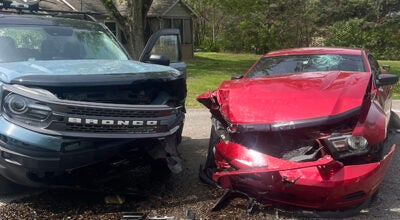40 Cass Young Entrepreneurs review business plans at Lowe
Published 8:55 am Monday, April 26, 2010

Dowagiac’s Danielle Taylor and Brooke Means, left, and Sara Curtis and Kelsey Cleveland, right, strategize with Courtnee Anderson of Cassopolis about how to cross the River Tweed, a leadership activity Friday at the Edward Lowe Foundation’s Billieville for the fifth annual Young Entrepreneurs Day done in partnership with Lewis Cass Intermediate School District.
By JOHN EBY
Dowagiac Daily News
CASSOPOLIS – Sara Curtis called her project for Young Entrepreneurs Day Friday at the Edward Lowe Foundation Chili Tattoo Fortress.
“I expected that look. Nobody’s given me that look. You’re the first,” the Dowagiac Union High School senior advised.
Chili “like the food,” though her tattoo parlor doesn’t serve any.
Chili “is just a word I wanted to use.”
Fortress because it sounded more “solid” than “palace,” which she rejected.
“I think she liked it,” Sara said of reviewer and retired banker Lynn Warner’s reaction.
“She looked intrigued.”
What Sara really wants to do is autopsies as a medical examiner educated at Johns Hopkins University.
It’s been her goal since sixth grade.
DUHS senior Brooke Means spent six weeks devising “A Moment in Time” photography studio for downtown Dowagiac she has just reviewed with Judd Lumber Co. President Dick Judd.
Means is a student of fourth-year business teacher Karen Vaickus, who runs three small businesses outside of school, including paperwork for her husband, who is self-employed.
Brooke plans to attend Southwestern Michigan College after graduation.
She did a photo shoot with Miss Dowagiac Katie Haneberg, who celebrated her 18th birthday Sunday, to produce images which will adorn her Alice in Wonderland Blossomtime float next weekend.
Dowagiac students developed sole proprietorships except for senior Danielle Taylor, who expects to study business at SMC, and sophomore Kelsey Cleveland.
The duo brought Habillez-Moi, a formalwear rental business they reviewed with Edwardsburg chiropractor Dr. Gregory Curtis.
Kelsey, who lives at Magician Lake, plans to start college at SMC for two years, then transfer to Michigan State University for a degree in marine biology.
“Then, later on in life, I want to do down to South Carolina. We went there on vacation.”
On the other side of the table, Dr. Diane Chaddock, SMC chief operating officer, is “enjoying the experience” as a first-time reviewer.
She analyzed Gabrielle Haller’s Dream Dance Company and was getting ready to critique Extreme Paintball by John Hayman and George Samadder.
The Lowe Foundation, in partnership with Lewis Cass Intermediate School District, created something students clearly love once they scale their initial trepidation of the unknown.
“They were scared and didn’t want to do it,” Vaickus said. “I had to talk some of them into it,” but eventually they come to regard the experience as one of the best they have. “I had some of last year’s kids talk to them.”
“This is my favorite day of the year,” Vaickus said.
Outdoors, across the green expanse between Billieville and boxcars which conceal lodging, the grass doubles as the toxic River Tweed, which they must figure out how to ford on boards which they cannot let go of without losing.
Their first timed crack ends in failure.
Not much teamwork, no plan and too many boards fumbled in practice.
“It felt pretty bad,” admitted Justin Massey of Cassopolis. “I felt like I let my team down.”
He brought to the Lowe Foundation a business plan he and Dwayne Morgan developed for a DJ service.
Two other Cassopolis students, Devin Roberts and Courtnee Anderson, emerge immediately as leaders of the column of crossers, with Jared Zachary bringing up the rear in a thankless job he didn’t seem to mind.
His task consisted of picking up boards and passing them back to the front.
They might have left him behind, but it’s like the Marines.
One rule is that every team member must reach their destination.
After strategizing, they try again to reach three blue-tarp “islands” without their direction drifting or landing in the drink, which causes everyone to start over.
Brooke maneuvered in the middle, where communicating when they were stepping was crucial so they never lost contact with the floor-tile-sized wooden square.
Sometimes physical contact with peers from other schools became necessary, holding hands, foot brushing foot or even embracing as two bodies buddied up on one board, adding non-verbal communication to talking to keep the rhythm driving them forward.
“It takes a lot of trust,” Skylar Makowski realized. “If someone in the back stepped wrong when they weren’t supposed to, we had to trust that they would step at the right time.”
Their attitudes improved the second time, but it may have been the difference between them and the first team, which quickly crossed the river.
Attitudes are contagious.
Theirs slowed the team down.
The other team’s positivity powered them to the other side in five fewer minutes.
The second time was also hindered by crossing in one long row as opposed to two shorter squads.
Connor Makowski carried two boards with him, but that usually leads to a misstep which sends everyone back to start over, or they get stranded.
In business, it’s hard to get out there by yourself. You can start a company solo, but as you grow, you have to trust and rely on your team when you can no longer do everything yourself.
Articulating a “key takeaway” they learned that can be applied in life, students cited communication, trust, teamwork and “if you don’t work together you fail,” according to Justin Massey.
“Not everybody has to be a leader,” Sara Curtis said, and small roles are all essential, too.
“Time management,” Devin Roberts added.
A tempting big customer like Walmart might not be the right fit if it carries you off track and overwhelms your capacity.
This marks the fifth year the Lowe Foundation will sponsor two Young Entrepreneurs Day events giving high school students from Cass, Van Buren and Berrien counties a chance to jump-start career plans.
On April 23 some 40 Cass County students visited the foundation’s headquarters at Big Rock Valley near Cassopolis.
There, they presented business plans they developed during entrepreneurship classes offered through their schools.
Presentations were made to local business leaders who serve as mentors.
Similarly, on May 5 about 250 students from Van Buren and Berrien counties travel to Lake Michigan College to share business plans and portfolios created through the counties’ career and technical education programs.
Attendees also have the opportunity to attend a variety of career-related seminars.
Their plans must clearly define everything from the overview of their product or service to marketing, operations, management and finances.
Young Entrepreneurs Day allows the aspiring entrepreneurs to make interactive presentations about their start-up companies as if they were meeting with potential investors.
Mentors ask questions, provide encouragement, make suggestions and assess each area of the plan according to set criteria and expectations.
For Cass County students, part of the day also involved participating in the leadership activity, including a blindfolded icebreaker.
At the end of Cass County Young Entrepreneurs Day, each student receives a certificate recognizing their efforts.
Mentors’ evaluations are tabulated later, and high scorers receive a $50 savings bond.
Yet the event remains an experience rather than a competition, says Joan Forburger, director of career technical education for Lewis Cass ISD.
Established in 1985, the Edward Lowe Foundation is a non-profit organization that supports entrepreneurship through research, recognition and educational programs, which are delivered through entrepreneur support organizations (ESOs).
The foundation focuses on second-stage companies – those that have moved beyond the startup phase and seek significant, steady growth.






